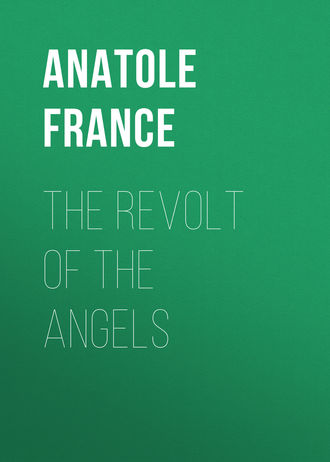 полная версия
полная версияThe Revolt of the Angels
On the Boulevard du Palais a band of students presented Maurice with a branch of palm. Maurice made a charming reply.
Maurice was overcome with emotion when he beheld the old house in which his childhood had been spent, and fell weeping into his mother's arms.
It was a great day, unhappily marred by one painful incident. Monsieur Sariette, who had lost his reason as a consequence of the shocking events that had taken place in the Rue de Courcelles, had suddenly become violent. He had shut himself up in the library, and there he had remained for twenty-four hours, uttering the most horrible cries, and, turning a deaf ear alike to threats and entreaties, refused to come out. He had spent the night in a condition of extreme restlessness, for all night long the lamp had been seen passing rapidly to and fro behind the curtains. In the morning, hearing Hippolyte shouting to him from the court below, he opened the window of the Hall of the Spheres and the Philosophers, and heaved two or three rather weighty tomes on to the old valet's head. The whole of the domestic staff – men, women, and boys – hurried to the spot, and the librarian proceeded to throw out books by the armful on to their heads. In view of the gravity of the situation, Monsieur René d'Esparvieu did not disdain to intervene. He appeared in night-cap and dressing-gown, and attempted to reason with the poor lunatic, whose only reply was to pour forth torrents of abuse on the man whom till then he had worshipped as his benefactor, and to endeavour to crush him beneath all the Bibles, all the Talmuds, all the sacred books of India and Persia, all the Greek Fathers, and all the Latin Fathers, Saint John Chrysostom, Saint Gregory Nazianzen, Saint Augustine, Saint Jerome, all the apologists, ay! and under the Histoire des Variations, annotated by Bossuet himself! Octavos, quartos, folios came crashing down, and lay in a sordid heap on the courtyard pavement. The letters of Gassendi, of Père Mersenne, of Pascal, were blown about hither and thither by the wind. The lady's-maid who had stooped down to rescue some of the sheets from the gutter got a blow on the head from an enormous Dutch atlas. Madame René d'Esparvieu had been terrified by the ominous sounds, and appeared on the scene without waiting to apply the finishing touches of powder and paint. When he caught sight of her, old Sariette became more violent than ever. Down they came one after another as hard as he could pelt them; the busts of the poets, philosophers, and historians of antiquity – Homer, Æschylus, Sophocles, Euripides, Herodotus, Thucydides, Socrates, Plato, Aristotle, Demosthenes, Cicero, Virgil, Horace, Seneca, Epictetus – all lay scattered on the ground. The celestial sphere and the terrestrial globe descended with a terrifying crash that was followed by a ghastly hush, broken only by the shrill laughter of little Léon, who was looking down on the scene from a window above. A locksmith having opened the library door, all the household hastened to enter, and found the aged Sariette entrenched behind piles of books, busily engaged in tearing and slashing away at the Lucretius of the Prior de Vendôme annotated in Voltaire's own hand. They had to force a way through the barricade. But the maniac, perceiving that his stronghold was being invaded, fled away and escaped on to the roof. For two whole hours he gave vent to shouts and yells that were heard far and wide. In the Rue Garancière the crowd kept growing bigger and bigger. All had their eyes fixed on the unhappy creature, and whenever he stumbled on the slates, which cracked beneath him, they gave a shout of terror. In the midst of the crowd, the Abbé Patouille, who expected every moment to see him hurled into space, was reciting the prayers for the dying, and making ready to give him the absolution in extremis. There was a cordon of police round the house keeping order. Someone summoned the fire-brigade, and the sound of their approach was soon heard. They placed a ladder against the wall of the house, and after a terrific struggle managed to secure the maniac, who in the course of his desperate resistance had one of the muscles of his arm torn out. He was immediately removed to an asylum.
Maurice dined at home, and there were smiles of tenderness and affection when Victor, the old butler, brought on the roast veal. Monsieur l'Abbé Patouille sat at the right hand of the Christian mother, unctuously contemplating the family which Heaven had so plentifully blessed. Nevertheless, Madame d'Esparvieu was ill at ease. Every day she received anonymous letters of so insulting and coarse a nature that she thought at first they must come from a discharged footman. She now knew they were the handiwork of her youngest daughter, Berthe, a mere child! Little Léon, too, gave her pain and anxiety. He paid no attention to his lessons, and was given to bad habits. He showed a cruel disposition. He had plucked his sister's canaries alive; he stuck innumerable pins into the chair on which Mademoiselle Caporal was accustomed to sit, and had stolen fourteen francs from the poor girl, who did nothing but cry and dab her eyes and nose from morning till night.
No sooner was dinner over than Maurice rushed off to the little dwelling in the Rue de Rome, impatient to meet his angel again. Through the door he heard a loud sound of voices, and saw assembled in the room where the apparition had taken place, Arcade, Zita, the angelic musician, and the Kerûb, who was lying on the bed, smoking a huge pipe, carelessly scorching pillows, sheets, and coverlets. They embraced Maurice, and announced their departure. Their faces shone with happiness and courage. Alone, the inspired author of Aline, Queen of Golconda, shed tears and raised his terrified gaze to heaven. The Kerûb forced him into the party of rebellion by setting before him two alternatives: either to allow himself to be dragged from prison to prison on earth, or to carry fire and sword into the palace of Ialdabaoth.
Maurice perceived with sorrow that the earth had scarcely any hold over them. They were setting out filled with immense hope, which was quite justifiable. Doubtless they were but a few combatants to oppose the innumerable soldiers of the sultan of the heavens; but they counted on compensating for the inferiority of their numbers by the irresistible impetus of a sudden attack. They were not ignorant of the fact that Ialdabaoth, who flatters himself on knowing all things, sometimes allows himself to be taken by surprise. And it certainly looked as if the first attack would have taken him unawares had it not been for the warning of the archangel Michael. The celestial army had made no progress since its victory over the rebels before the beginning of Time.
As regards armaments and material it was as out of date as the army of the Moors. Its generals slumbered in sloth and ignorance. Loaded with honours and riches, they preferred the delights of the banquet to the fatigues of war. Michael, the commander-in-chief, ever loyal and brave, had lost, with the passing of centuries, his fire and enthusiasm. The conspirators of 1914, on the other hand, knew the very latest and the most delicate appliances of science for the art of destruction. At length all was ready and decided upon. The army of revolt, assembled by corps each a hundred thousand angels strong, on all the waste places of the earth – steppes, pampas, deserts, fields of ice and snow – was ready to launch itself against the sky. The angels, in modifying the rhythm of the atoms of which they are composed, are able to traverse the most varied mediums. Spirits that have descended on to the earth, being formed, since their incarnation, of too compact a substance, can no longer fly of themselves, and to rise into ethereal regions and then insensibly grow volatilized, have need of the assistance of their brothers, who, though revolutionaries like themselves, nevertheless, stayed behind in the Empyrean and remained, not immaterial (for all is matter in the Universe), but gloriously untrammelled and diaphanous. Certes, it was not without painful anxiety that Arcade, Istar, and Zita prepared themselves to pass from the heavy atmosphere of the earth to the limpid depths of the heavens. To plunge into the ether there is need to expend such energy that the most intrepid hesitate to take flight. Their very substance, while penetrating this fine medium, must in itself grow fine-spun, become vaporised, and pass from human dimensions to the volume of the vastest clouds which have ever enveloped the earth. Soon they would surpass in grandeur the uttermost planets, whose orbits they, invisible and imponderable, would traverse without disturbing.
In this enterprise – the vastest that angels could undertake – their substance would be ultimately hotter than the fire and colder than the ice, and they would suffer pangs sharper than death.
Maurice read all the daring and the pain of the undertaking in the eyes of Arcade.
"You are going?" he said to him, weeping.
"We are going, with Nectaire, to seek the great archangel to lead us to victory."
"Whom do you call thus?"
"The priests of the demiurge have made him known to you in their calumnies."
"Unhappy being," sighed Maurice.
Arcade embraced him, and Maurice felt the angel's tears as they dropped upon his cheek.
CHAPTER XXXV
AND LAST, WHEREIN THE SUBLIME DREAM OF SATAN IS UNFOLDED
CLIMBING the seven steep terraces which rise up from the bed of the Ganges to the temples muffled in creepers, the five angels reached, by half-obliterated paths, the wild garden filled with perfumed clusters of grapes and chattering monkeys, and, at the far end thereof, they discovered him whom they had come to seek. The archangel lay with his elbow on black cushions embroidered with golden flames. At his feet crouched lions and gazelles. Twined in the trees, tame serpents turned on him their friendly gaze. At the sight of his angelic visitors his face grew melancholy. Long since, in the days when, with his brow crowned with grapes and his sceptre of vine-leaves in his hand, he had taught and comforted mankind, his heart had many times been heavy with sorrow; but never yet, since his glorious downfall, had his beautiful face expressed such pain and anguish.
Zita told him of the black standards assembled in crowds in all the waste places of the globe; of the deliverance premeditated and prepared in the provinces of Heaven, where the first revolt had long ago been fomented.
"Prince," she went on, "your army awaits you. Come, lead it on to victory."
"Friends," replied the great archangel, "I was aware of the object of your visit. Baskets of fruit and honeycombs await you under the shade of this mighty tree. The sun is about to descend into the roseate waters of the Sacred River. When you have eaten, you will slumber pleasantly in this garden, where the joys of the intellect and of the senses have reigned since the day when I drove hence the spirit of the old Demiurge. To-morrow I will give you my answer."
Night hung its blue over the garden. Satan fell asleep. He had a dream, and in that dream, soaring over the earth, he saw it covered with angels in revolt, beautiful as gods, whose eyes darted lightning. And from pole to pole one single cry, formed of a myriad cries, mounted towards him, filled with hope and love. And Satan said:
"Let us go forth! Let us seek the ancient adversary in his high abode." And he led the countless host of angels over the celestial plains. And Satan was cognizant of what took place in the heavenly citadel. When news of this second revolt came thither, the Father said to the Son:
"The irreconcilable foe is rising once again. Let us take heed to ourselves, and in this, our time of danger, look to our defences, lest we lose our high abode."
And the Son, consubstantial with the Father, replied:
"We shall triumph under the sign that gave Constantine the victory."
Indignation burst forth on the Mountain of God. At first the faithful Seraphim condemned the rebels to terrible torture, but afterwards decided on doing battle with them. The anger burning in the hearts of all inflamed each countenance. They did not doubt of victory, but treachery was feared, and eternal darkness had been at once decreed for spies and alarmists.
There was shouting and singing of ancient hymns and praise of the Almighty. They drank of the mystic wine. Courage, over-inflated, came near to giving way, and a secret anxiety stole into the inner depths of their souls. The archangel Michael took supreme command. He reassured their minds by his serenity. His countenance, wherein his soul was visible, expressed contempt for danger. By his orders, the chiefs of the thunderbolts, the Kerûbs, grown dull with the long interval of peace, paced with heavy steps the ramparts of the Holy Mountain, and, letting the gaze of their bovine eyes wander over the glittering clouds of their Lord, strove to place the divine batteries in position. After inspecting the defences, they swore to the Most High that all was in readiness. They took counsel together as to the plan they should follow. Michael was for the offensive. He, as a consummate soldier, said it was the supreme law. Attack, or be attacked, – there was no middle course.
"Moreover," he added, "the offensive attitude is particularly suitable to the ardour of the Thrones and Dominations."
Beyond that, it was impossible to obtain a word from the valiant chief, and this silence seemed the mark of a genius sure of himself.
As soon as the approach of the enemy was announced, Michael sent forth three armies to meet them, commanded by the archangels Uriel, Raphael, and Gabriel. Standards, displaying all the colours of the Orient, were unfurled above the ethereal plains, and the thunders rolled over the starry floors. For three days and three nights was the lot of the terrible and adorable armies unknown on the Mountain of God. Towards dawn on the fourth day news came, but it was vague and confused. There were rumours of indecisive victories; of the triumph now of this side, now of that. There came reports of glorious deeds which were dissipated in a few hours.
The thunderbolts of Raphael, hurled against the rebels, had, it was said, consumed entire squadrons. The troops commanded by the impure Zita were thought to have been swallowed up in the whirlwind of a tempest of fire. It was believed that the savage Istar had been flung headlong into the gulf of perdition so suddenly that the blasphemies begun in his mouth had been forced backwards with explosive results. It was popularly supposed that Satan, laden with chains of adamant, had been plunged once again into the abyss. Meanwhile, the commanders of the three armies had sent no messages. Mutterings and murmurs, mingling with the rumours of glory, gave rise to fears of an indecisive battle, a precipitate retreat. Insolent voices gave out that a spirit of the lowest category, a guardian angel, the insignificant Arcade, had checked and routed the dazzling host of the three great archangels.
There were also rumours of wholesale defection in the Seventh Heaven, where rebellion had broken out before the beginning of Time, and some had even seen black clouds of impious angels joining the armies of the rebels on Earth. But no one lent an ear to the odious rumours, and stress was laid on the news of victory which ran from lip to lip, each statement readily finding confirmation. The high places resounded with hymns of joy; the Seraphim celebrated on harp and psaltery Sabaoth, God of Thunder. The voices of the elect united with those of the angels in glorifying the Invisible and at the thought of the bloodshed that the ministers of holy wrath had caused among the rebels, sighs of relief and jubilation were wafted from the Heavenly Jerusalem towards the Most High. But the beatitude of the most blessed, having swelled to the utmost limit before due time, could increase no more, and the very excess of their felicity completely dulled their senses.
The songs had not yet ceased when the guards watching on the ramparts signalled the approach of the first fugitives of the divine army; Seraphim on tattered wing, flying in disorder, maimed Kerûbs going on three feet. With impassive gaze, Michael, prince of warriors, measured the extent of the disaster, and his keen intelligence penetrated its causes. The armies of the living God had taken the offensive, but by one of those fatalities in war which disconcert the plans of the greatest captains, the enemy had also taken the offensive, and the effect was evident. Scarcely were the gates of the citadel opened to receive the glorious but shattered remnants of the three armies, when a rain of fire fell on the Mountain of God. Satan's army was not yet in sight, but the walls of topaz, the cupolas of emerald, the roofs of diamond, all fell in with an appalling crash under the discharge of the electrophores. The ancient thunderclouds essayed to reply, but the bolts fell short, and their thunders were lost in the deserted plains of the skies.
Smitten by an invisible foe, the faithful angels abandoned the ramparts. Michael went to announce to his God that the Holy Mountain would fall into the hands of the demon in twenty-four hours, and that nothing remained for the Master of the Heavens but to seek safety in flight. The Seraphim placed the jewels of the celestial crown in coffers. Michael offered his arm to the Queen of Heaven, and the Holy Family escaped from the palace by a subterranean passage of porphyry. A deluge of fire was falling on the citadel. Regaining his post once more, the glorious archangel declared that he would never capitulate, and straightway advanced the standards of the living God. That same evening the rebel host made its entry into the thrice-sacred city. On a fiery steed Satan led his demons. Behind him marched Arcade, Istar, and Zita. As in the ancient revels of Dionysus, old Nectaire bestrode his ass. Thereafter, floating out far behind, followed the black standards.
The garrison laid down their arms before Satan. Michael placed his flaming sword at the feet of the conquering archangel.
"Take back your sword, Michael," said Satan. "It is Lucifer who yields it to you. Bear it in defence of peace and law." Then letting his gaze fall on the leaders of the celestial cohorts, he cried in a ringing voice:
"Archangel Michael, and you, Powers, Thrones, and Dominations, swear all of you to be faithful to your God."
"We swear it," they replied with one voice.
And Satan said:
"Powers, Thrones, and Dominations, of all past wars, I wish but to remember the invincible courage that you displayed and the loyalty which you rendered to authority, for these assure me of the steadfastness of the fealty you have just sworn to me."
The following day, on the ethereal plain, Satan commanded the black standards to be distributed to the troops, and the winged soldiers covered them with kisses and bedewed them with tears.
And Satan had himself crowned God. Thronging round the glittering walls of Heavenly Jerusalem, apostles, pontiffs, virgins, martyrs, confessors, the whole company of the elect, who during the fierce battle had enjoyed delightful tranquillity, tasted infinite joy in the spectacle of the coronation.
The elect saw with ravishment the Most High precipitated into Hell, and Satan seated on the throne of the Lord. In conformity with the will of God which had cut them off from sorrow they sang in the ancient fashion the praises of their new Master.
And Satan, piercing space with his keen glance, contemplated the little globe of earth and water where of old he had planted the vine and formed the first tragic chorus. And he fixed his gaze on that Rome where the fallen God had founded his empire on fraud and lie. Nevertheless, at that moment a saint ruled over the Church. Satan saw him praying and weeping. And he said to him:
"To thee I entrust my Spouse. Watch over her faithfully. In thee I confirm the right and power to decide matters of doctrine, to regulate the use of the sacraments, to make laws and to uphold purity of morals. And the faithful shall be under obligation to conform thereto. My Church is eternal, and the gates of hell shall not prevail against it. Thou art infallible. Nothing is changed."
And the successor of the apostles felt flooded with rapture. He prostrated himself, and with his forehead touching the floor, replied:
"O Lord, my God, I recognise Thy voice! Thy breath has been wafted like balm to my heart. Blessed be Thy name. Thy will be done on Earth, as it is in Heaven. Lead us not into temptation, but deliver us from evil."
And Satan found pleasure in praise and in the exercise of his grace; he loved to hear his wisdom and his power belauded. He listened with joy to the canticles of the cherubim who celebrated his good deeds, and he took no pleasure in listening to Nectaire's flute, because it celebrated nature's self, yielded to the insect and to the blade of grass their share of power and love, and counselled happiness and freedom. Satan, whose flesh had crept, in days gone by, at the idea that suffering prevailed in the world, now felt himself inaccessible to pity. He regarded suffering and death as the happy results of omnipotence and sovereign kindness. And the savour of the blood of victims rose upward towards him like sweet incense. He fell to condemning intelligence and to hating curiosity. He himself refused to learn anything more, for fear that in acquiring fresh knowledge he might let it be seen that he had not known everything at the very outset. He took pleasure in mystery, and believing that he would seem less great by being understood, he affected to be unintelligible. Dense fumes of Theology filled his brain. One day, following the example of his predecessor, he conceived the notion of proclaiming himself one god in three persons. Seeing Arcade smile as this proclamation was made, he drove him from his presence. Istar and Zita had long since returned to earth. Thus centuries passed like seconds. Now, one day, from the altitude of his throne, he plunged his gaze into the depths of the pit and saw Ialdabaoth in the Gehenna where he himself had long lain enchained. Amid the everlasting gloom Ialdabaoth still retained his lofty mien. Blackened and shattered, terrible and sublime, he glanced upwards at the palace of the King of Heaven with a look of proud disdain, then turned away his head. And the new god, as he looked upon his foe, beheld the light of intelligence and love pass across his sorrow-stricken countenance. And lo! Ialdabaoth was now contemplating the Earth and, seeing it sunk in wickedness and suffering, he began to foster thoughts of kindliness in his heart. On a sudden he rose up, and beating the ether with his mighty arms, as though with oars, he hastened thither to instruct and to console mankind. Already his vast shadow shed upon the unhappy planet a shade soft as a night of love.
And Satan awoke bathed in an icy sweat.
Nectaire, Istar, Arcade, and Zita were standing round him. The finches were singing.
"Comrades," said the great archangel, "no – we will not conquer the heavens. Enough to have the power. War engenders war, and victory defeat.
"God, conquered, will become Satan; Satan, conquering, will become God. May the fates spare me this terrible lot; I love the Hell which formed my genius. I love the Earth where I have done some good, if it be possible to do any good in this fearful world where beings live but by rapine. Now, thanks to us, the god of old is dispossessed of his terrestrial empire, and every thinking being on this globe disdains him or knows him not. But what matter that men should be no longer submissive to Ialdabaoth if the spirit of Ialdabaoth is still in them; if they, like him, are jealous, violent, quarrelsome, and greedy, and the foes of the arts and of beauty? What matter that they have rejected the ferocious Demiurge, if they do not hearken to the friendly demons who teach all truths; to Dionysus, Apollo, and the Muses? As to ourselves, celestial spirits, sublime demons, we have destroyed Ialdabaoth, our Tyrant, if in ourselves we have destroyed Ignorance and Fear."
And Satan, turning to the gardener, said:
"Nectaire, you fought with me before the birth of the world. We were conquered because we failed to understand that Victory is a Spirit, and that it is in ourselves and in ourselves alone that we must attack and destroy Ialdabaoth."
THE END








